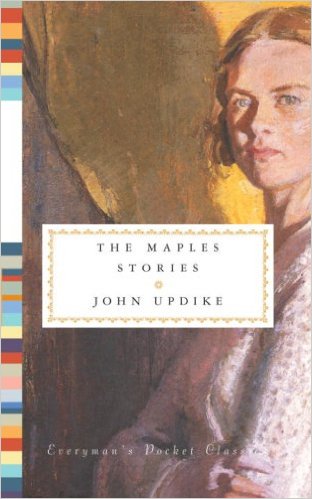The Maples had talked and thought about separation so long it seemed it would never come. –“Twin Beds in Rome,” The Maples Stories, by John Updike
At the turn of this century, we all thought John Updike would win the Nobel; that is, unless they gave it to Joyce Carol Oates or Philip Roth. (No American writer has won since 1993.) Best known for the Rabbit tetralogy, a brilliant chronicle of a bewildered anti-hero who peaked playing basketball in high school and balks at the prospect of working at his father-in-law’s car dealership, Updike wrote approximately 60 novels and collections of short stories, essays, criticism, and poems.
He often explores the fragility of conventional relationships and life in the suburbs. He was so well-known for writing about adultery that his novel, Couples, inspired a Time cover story in 1968, “The Adulterous Society,” with Updike’s portrait on the cover.
I think his short stories are actually his best work. I recently read The Maples Stories, an elegant collection about the decline and fall of the marriage of Richard and Joan Maple. Written between 1956 and 1994, these vibrant stories are slices of life filled with poetic details about daily routine as well as sharp, witty dialogue about the couple’s disagreements and adulteries. In “Snowing in Greenwich Village,” when we first meet Richard and Joan, they have been married two years and are madly in love. But their marriage is subtly threatened when Joan’s friend Rebecca invites Richard up to her apartment after he walks her home. He is not interested in her, but we realize adultery looms not far in the future.
Each story is a subtle paean to the joys, sadness, and inescapable limits of connubial love. The stories are told from Richard’s point of view, and he both loves and is irked by Joan, the intelligent, clear-sighted, yoga-practicing daughter of an Episcopalian minister. In “Wife-Wooing,” he finds her so beautiful while they eat hamburgers and french fries with the children that he is relieved when on Monday she “wakes up ugly.” In “Marching through Boston,” he mocks “the salubrious effect” of the Civil Rights movement on Joan, who comes back from the march in Selma and persuades him to accompany her on another march in Boston. Afterwards, he mocks the speeches and insists on immaturely satirizing the whole event in Southern dialect. How maddened Joan must have been by his teasing! (I can see why Updike was the editor of The Harvard Lampoon.)
“Now, effen,” he said, “bah some unfoh-choonut chayunce, mah spirrut should pass owen, bureh me bah de levee, so mebbe Ah kin heeah de singin’ an’ de banjos an’ de cotton bolls a-bustin’…”
It is not his flippancy, but adultery that finally divides them. Richard has lovers, and Joan knows about them. She even knows about the red herrings, the women he flirts with so she won’t know who his real lovers are. And sometimes it seems that Richard is trying to push her into adultery.
In “Your Lover Just Called,” Richard comes home from buying cigarettes and through the window Joan kissing their guest, Mack, who is getting divorced,. Mack claims it was just a fraternal kiss.
“Really, Dick,” Joan said. “I think it’s shockingly sneaky of you to be standing around spying into your own windows.”
“Standing around! I was transfixed with horror. It was a real trauma. My first primal scene.”
Later, she is furious when he claims a hang-up call is her lover calling.
“Go to her!” Joan suddenly cried…. “Go to her like a man and stop trying to maneuver me into something I don’t understand. I have no lover!”
Later, she does have lovers. But is it because he does? Or is it just a part of marriage? The way to their divorce is difficult, because they are so fond of each other, and there is the bond of four children and the house.
A very moving collection of stories, and I liked both characters so much.
Updike, of course, says it better than anyone else can. He writes in the preface,
The musical pattern, the rise and retreat, of the Maples’ duet is repeated over and over, ever more harshly transposed. They are shy, cheerful, and dissatisfied. They like one another, and are mysteries to one another. One of them is usually feeling slightly unwell, and the seesaw of their erotic interest rarely balances. Yet they talk, more easily than any other characters the author has acted as agent for.
It is very sad when the Maples get divorced.


I confess I’ve never read any Updike, but you make this sound very appealing….. 🙂
LikeLike
Oh, he is so good! One of the best…
LikeLiked by 1 person
I used to read Updike when he was still very popular and that was ages ago. I saw him once at a talk he gave at McGill. What I recall was how he kind of glowed; there was an aura about him that set him apart from everyone else, a kind of luminosity. More recently I taught one of his short stories, the classic “A&P,” and it too was a revelation, seemingly so mundane on the surface, yet actually profound. Updike manages to capture a moment that changes a young man’s life, probably forever. A stroke of genius.
LikeLike
I love “A&P.” He was a genius. I would have loved to see Updike!
LikeLike
Mother used to love Updike but was not keen on my reading him. Time for me to go and see by myself. Is it wrong to say that I see similarities with Alison Lurie?
LikeLike
Well, he DID write a lot about adultery! so I can see why your mother might not have wanted you to read him. Very different styles, but he and Lurie covered some of the same territory.
LikeLiked by 1 person